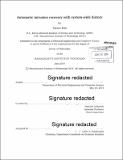Automatic intrusion recovery with system-wide history
Author(s)
Kim, Taesoo, Ph. D. Massachusetts Institute of Technology
DownloadFull printable version (14.92Mb)
Other Contributors
Massachusetts Institute of Technology. Department of Electrical Engineering and Computer Science.
Advisor
Nickolai Zeldovich.
Terms of use
Metadata
Show full item recordAbstract
Compromises of our computer systems are inevitable. New software vulnerabilities are discovered and exploited daily, but even if the software is bug-free, administrators may inadvertently make mistakes in configuring permissions, or unaware users may click on buttons in application installers with little understanding of its consequences. Unfortunately, recovering from those inevitable compromises leads to days and weeks of wasted effort by users or system administrators, with no conclusive guarantee that all traces of the attack have been cleaned up. This dissertation presents RETRO, an automatic recovery system that repairs a computer after an adversary compromises it, by undoing the adversary's changes while preserving legitimate user actions, with minimal user involvement. During normal operation, RETRO records an action history graph to describe the system's execution, enabling RETRO to trace the adversary's changes and their effects. During repair, RETRO uses the action history graph to undo an unwanted action and its indirect effects by first rolling back its direct effects, and then re-executing legitimate actions that were influenced by that change. To minimize re-execution and user involvement, RETRO uses predicates to selectively re-execute only actions that were semantically affected by the adversary's changes, uses refinement to represent high level semantics into the action history graph, and uses compensating actions to handle external effects. An evaluation of a prototype of RETRO for Linux with 2 real-world attacks, 2 synthesized challenge attacks, and 6 attacks from previous work, shows that RETRO can handle a wide range of real attacks with minimal user involvement, and preserve user's changes by efficiently re-executing parts of an action history graph. These benefits come at the cost of 35-127% in execution time overhead and of 4-150 GB of log space per day, depending on the workload. For example, a HotCRP paper submission web site incurs 35% slowdown and generates 4 GB of logs per day under the workload from 30 minutes prior to the SOSP 2007 deadline. We believe those overheads are acceptable in systems whose integrity is critical in their operations.
Description
Thesis: Ph. D., Massachusetts Institute of Technology, Department of Electrical Engineering and Computer Science, 2014. Cataloged from PDF version of thesis. Includes bibliographical references (pages 67-71).
Date issued
2014Department
Massachusetts Institute of Technology. Department of Electrical Engineering and Computer SciencePublisher
Massachusetts Institute of Technology
Keywords
Electrical Engineering and Computer Science.